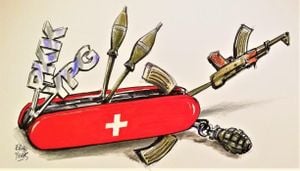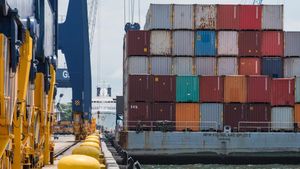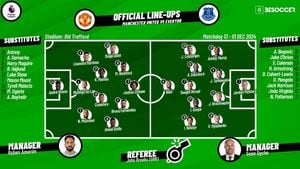The Central Board of Secondary Education (CBSE) is currently grappling with allegations of paper leaks related to the 2025 board exams, raising significant concerns about the accuracy of information circulating on social media. The controversy erupted when rumors about the Class 10 Science exam being leaked spread across platforms like YouTube and Facebook. The CBSE responded decisively, categorically denying any instances of these leaks during the examination period and describing the rumors as "baseless" and "intended to create unnecessary panic among students and parents."
Commencing on February 15, the CBSE examinations for both Class 10 and 12 are set to conclude on April 4, 2025. This timeline sees approximately 44 lakh students from around 8,000 schools across India and abroad navigate through their examinations, underscoring the gravity of misinformation during such pivotal times. The board’s commitment to maintaining the integrity of the examination process has never been more pronounced.
On February 19, CBSE officials released an official statement, assuring all stakeholders of the numerous precautions taken to secure the examination process. The board emphasized the need for accurate information, especially when fake news can wreak havoc on students’ mental health and overall examination atmosphere.
With the spread of misinformation causing unrest among students and parents alike, the CBSE urged everyone to rely exclusively on information disseminated through its official channels. The board directed concerned individuals to its official website (http://www.cbse.gov.in) as the sole source for authentic updates related to examinations. The preliminary warning highlights the role digital literacy plays today, emphasizing how pivotal it is for both students and parents to differentiate credible information from false narratives.
Compounding the situation, the board took specific note of YouTube creator Zaki Saudagar, who claimed the Class 12 Physical Education exam, conducted on February 17, had also been leaked via the messaging application Telegram. Saudagar suggested he received access to leaked exam material the night prior to the test, igniting fears of widespread cheating, especially following previous controversies around paper leaks during similar tests.
The CBSE described such claims as another unnecessary panic, stating, "It has come to the board's attention...that certain unscrupulous elements are spreading rumors... These claims are baseless and are intended to create unnecessary panic among students and parents." The board continues to advise vigilance against such misinformation, indicating their serious approach to combating the disruptive influence of fake news during examinations.
To address these false claims effectively, CBSE has frowned upon those dissemining misleading information. The board has commenced close collaborations with law enforcement agencies to identify and take appropriate action against those responsible for circulating these rumors. According to CBSE guidelines, engaging with exam-related content on social media is taken very seriously, with possible penalties including the cancellation of participation rights and barring from future examinations for up to three years.
Exam paper leaks are not unprecedented; past incidents have resulted in public outcry and reform calls within the educational system. Consequently, when confronted with such rumors, the CBSE’s latest moves not only aim to assure the public of the examination's integrity but also to preserve students' mental health and trust within educational institutions.
The recent surge of misinformation presents challenges, and the CBSE recognizes the pivotal role of digital literacy. Through proactive measures and by urging students and parents to bolster their discernment skills, the board hopes to reduce the toll fake news takes on students and maintain the integrity of the examination process.
Meanwhile, the board's response and solidarity among students and educational institutions during these periods cannot be understated. The current educational atmosphere emphasizes the need for verified information, and stakeholders must collaborate to build trust as they navigate this testing period.
Efforts to combat misinformation underline the shared responsibility of both educational institutions and individuals alike. CBSE’s firm stance against false narratives aims not only to create a safer environment for students but also to mitigate the risk of repeating the challenges viewed over past years. Maintaining public confidence becomes imperative as schools strive for transparency and fairness amid fluctuated environments shaped by digital narratives.
With the exams underway, it remains to be seen how successfully the CBSE manages to maintain focus on its core values of fairness and trust, buoyed by cooperation among all stakeholders. By adopting stringent measures and promoting verified sources of information, the board extends not only its credibility but also deepens its commitment to nurturing academic integrity during these pivotal moments.



